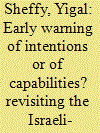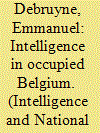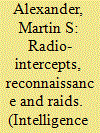|
|
|
Sort Order |
|
|
|
Items / Page
|
|
|
|
|
|
|
| Srl | Item |
| 1 |
ID:
123951


|
|
|
|
|
| Publication |
2013.
|
| Summary/Abstract |
A major school of thought in Israel asserts that: (1) a cornerstone of the Israeli security doctrine is gaining early warning based more on changes of the enemy's capabilities and less on learning its intentions; and (2) that deviation from the doctrine caused the strategic surprise experienced by the state on the outbreak of the 1973 Yom Kippur war. This assertion is examined here by looking into another case in which Israel was also militarily surprised. In February 1960 the Egyptian Army deployed offensively along the joint border, while the IDF remained unaware of the situation. Israel's conduct during the affair - known as the Rotem Affair - was based on lenient assessments (derived from sigint) regarding the Egyptian intentions, ignoring their capabilities. It transpires, therefore, that dominance of 'early warning of intentions' has been the rule rather than the exception.
|
|
|
|
|
|
|
|
|
|
|
|
|
|
|
|
| 2 |
ID:
123950


|
|
|
|
|
| Publication |
2013.
|
| Summary/Abstract |
Between 1958 and 1960, the French domestic security and intelligence services came to establish a close, multi-layered, and secret working relationship with their German counterparts. The purpose of this collaborative arrangement was to enlist German support in combating the subversive activities of the Algerian Front de Libération Nationale, whose members had taken refuge in Germany. In particular, the metropolitan authorities sought to impose on their German counterparts some of the same methods of colonial policing and intelligence that characterized their own counter-insurgency in France. These efforts proved counter-productive, however, for in internationalizing the Algerian war, they drew public attention to the colonial nature of France's hold over Algeria.
|
|
|
|
|
|
|
|
|
|
|
|
|
|
|
|
| 3 |
ID:
123948


|
|
|
|
|
| Publication |
2013.
|
| Summary/Abstract |
In May 1945, as France celebrated the end of the Second World War in Europe, its foremost overseas dependency, Algeria, erupted into rebellion. Revisiting the roles and responses of the colonial security forces to what came to be known as the Sétif uprising, this article suggests two things. One is that the intensity of repressive violence pursued becomes more explicable once we consider the part played by political intelligence gathering in the operation of French colonial government in Algeria. The other is that the decision to use the political intelligence amassed before, during, and after the rebellion to coerce the Algerian population at the rebellion's epicentre signified a fundamental shift in the nature of the French colonial state in Algeria. Intelligence-led security policing, much of it later adopted by police agencies in metropolitan France at the height of the Algerian War, became more repressive, less selective, and highly violent.
|
|
|
|
|
|
|
|
|
|
|
|
|
|
|
|
| 4 |
ID:
123946


|
|
|
|
|
| Publication |
2013.
|
| Summary/Abstract |
During both World Wars, one of the most powerful weapons Belgian citizens possessed in resisting German occupation of their country was the gathering of intelligence on the enemy for the allied armies. But Belgian's first and second secret wars were different in several respects, one of the most important being the relationship between the Belgian secret services in exile and their British counterparts. If the First World War was essentially a story of bitter concurrency between them, the Second was mostly a tale of 'jealous' partnership. The relations with the intelligence networks in occupied Belgium formed a delicate but crucial issue, where money played an important role. This article explores these dynamics and how they affected the main mission of gathering intelligence on the Germans.
|
|
|
|
|
|
|
|
|
|
|
|
|
|
|
|
| 5 |
ID:
123945


|
|
|
|
|
| Publication |
2013.
|
| Summary/Abstract |
The lack of academic interest in intelligence in France partly explains the prevalence of many preconceived ideas about French Intelligence. This article deals with the slow building of France's intelligence machinery in the nineteenth century, as part of a study of the modern French State. At this time, intelligence practices were transformed by the appearance of several intelligence bureaucracies. Studying three dimensions of the development - informal practices, formal organizations and statutory rules - the article demonstrates the closeness of intelligence to politics. Doing so it suggests that intelligence needs to be considered not only as an instrument of policy-making but as an actor at the centre of the modern French state, a part of its very essence.
|
|
|
|
|
|
|
|
|
|
|
|
|
|
|
|
| 6 |
ID:
123947


|
|
|
|
|
| Publication |
2013.
|
| Summary/Abstract |
Mentioned in memoirs by a few former military intelligence officers, operational intelligence has had little attention in academic writing on the Second World War before Ultra's decisive contributions began in 1941-2. Especially neglected has been the fighting provoked by the German offensive in 1940 that cleaved through France, Belgium, the Netherlands and Luxembourg and drove Britain off the Continent. This article tackles this gap, analysing the military intelligence/military operations interface on the French side. It assesses the contributions and shortcomings of radio-intercept intelligence, along with intelligence-gathering by air and ground reconnaissance (demonstrating that German air superiority imposed a 'battle blindness' on Allied commanders wanting intelligence on approach marches and formation switches more than a dozen kilometres into the German rear). It reveals that frontline infantry raiding - redolent of intelligence-gathering techniques familiar to veterans of 1914-18 trench warfare - was again widely employed. This proved a highly effective recourse, particularly during the positional battles on the Somme, Aisne and Oise in June 1940, filling intelligence gaps left by more technologically sophisticated but more fragile sources. The factors that kept formations fighting so as to inflict significant delays and heavy losses on the German assaults were robust communications networks (to convey operational intelligence fast enough to permit counter-manoeuvres based on it), and the preservation of French chains of command and control. When these key nodes collapsed, preventing the hard-won operational intelligence being deployed to coordinate French military resistance, the latter declined into a series of disjointed, directionless and unavailing acts of courage that could not exploit the several instances during the campaign when the Germans, too, were afflicted by battle fatigue, re-supply bottlenecks and morale wobbles.
|
|
|
|
|
|
|
|
|
|
|
|
|
|
|
|
|
|
|
|
|